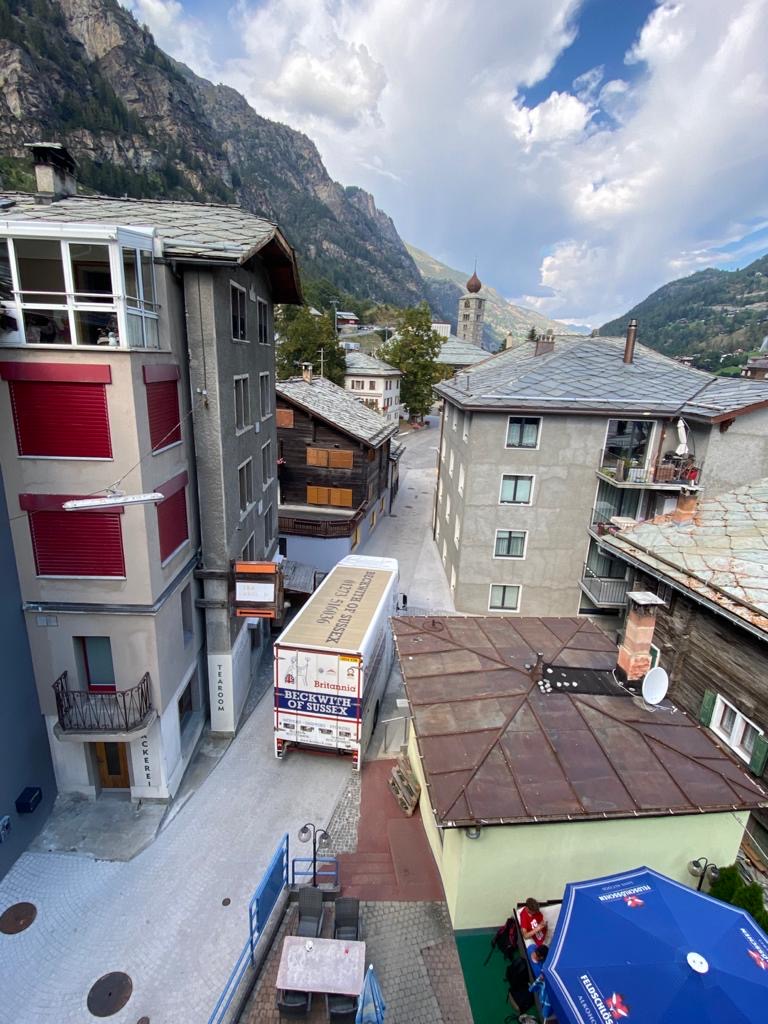Moving To Switzerland From The UK
Moving to Switzerland
Whether you are planning to move to Zurich, Geneva, or to the mountainous southern part of the country, Britannia Movers International has the expertise and the international resources to suit the move to your individual needs.
Importing Personal Effects to SwitzerlandThe importation of used goods and personal effects to Switzerland is usually duty and tax free. You will need proof of identity, an employment contract or work permit, and a Swiss Customs Declaration to fulfil the stringent entry regulations. Britannia can provide the necessary customs forms and other information on importing household effects. |
|
Swiss Customs Prohibitions and RestrictionsIn general, it is in your interest not to import the following items:
|
|
Transit Times to SwitzerlandTransit times can vary subject to the method of transport chosen, size of your consignment and the final destination. As an approximation, sea and road freight can take between 14 and 28 days, and ai freight can take 4-10 days. However, Britannia will advise you of a more accurate time once the necessary information is established. |
|
Protecting Your Items for Transport to SwitzerlandAll shared load consignments will be bar-coded before they are loaded into the vehicle. This will ensure that no items are left at origin. |
|
Moving Pets to SwitzerlandBritannia can recommend a specialised shipper of animals to assist you in sending your family pet(s) from home to home. They will coordinate all documentation and necessary veterinary procedures. Find out more about pet transport. |
|
Moving Motor Vehicles to SwitzerlandImportation of cars to Switzerland will be subject to compliance, and duty tax may apply. Any car sold in the European Community is normally automatically in accordance with Swiss law, you will however need to register your car and request license plates once you arrive in Switzerland. |
|
Currency Transfer for SwitzerlandWhen you are making international payments for individuals you can benefit from IFX expertise in seeking the best possible rate, whether you are sending or receiving foreign currency. IFX can help to protect you from exchange rate fluctuations and save you time and money on international payments. IFX offers:
More info on the IFX website. |
Moving to Switzerland with Britannia
- Your Move to Switzerland with Britannia – Britannia Movers has been providing removal services to Switzerland for many years. We can transport your household effects by our removal vans, sea containers or by air. We can also provide computer tracking and bar coding which will ensure the safety of your consignment.
- Custom Clearance – It will be necessary to clear your goods upon arrival. You will also need appropriate documentation and will have to prove that you have the necessary status to move to Switzerland.
- Additional Removal Services – Britannia can provide a variety of additional removal services when moving to Switzerland. We can arrange international insurance, and storage, and can also take care of your pet transport and money transfer.
If you want to find out more about moving to Switzerland, read more about our European removals, additional moving services, and request a removals quote.
Living in Switzerland
Switzerland has always been a popular European destination, especially for the lovers of mountainous landscapes, and for those conducting business, or looking for employment. However, as Switzerland is not part of the EU, moving to the country is not as hassle-free as moving to Germany for example, and for those looking for a more relaxed atmosphere, Switzerland is not the most attractive destination. This prosperous and economically strong country with stunning landscapes, however is an ideal location for many, and offers a wide range of employment opportunities, especially in the financial and business sectors.
Switzerland is a landlocked country located in Western Europe, divided between the mountains of the Alps and the Central Plateau, and bordered by Germany, France, and Italy among other countries. Switzerland has a history of political neutrality, and is not part of the European Union or the European Economic Area. It is one of the most prosperous countries in the world, is ranked as the most innovative country in Europe, and has a highly competitive economy. The strong economy ensures a high standard of living and Zurich and Geneva are both ranked very high for quality of life. This also means a very low crime rate and a lack of widespread social problems.
While winters can be cold, especially the mountainous regions, and the society is said to be less open to expats and immigrants than some other countries, Switzerland is generally a safe and politically stable place to live, which makes it an ideal destination for many. The diversity of stunning landscapes and climates are perfect not only for the lovers of skiing, but also for those who enjoy hiking, and want to see some beautiful sceneries. Whether you enjoy the nature and rural areas or prefer modern cities, Switzerland can be a perfect location.
Switzerland Language
Switzerland has four official languages: German, French, Italian and Romansh. German is usually thought of as the primary language for the country, with 60% of the population speaking it. In 17 of the Swiss cantons, German is the only official language. Across the rest of the country, around 20% of people speak French, 8% Italian, and 0.5% Romanesh.
Many Swiss people use English to speak to other Swiss people of different linguistic backgrounds. Much branding and advertising across Switzerland uses English as a common language, negating the need to tailor for regional differences.
Visas for Switzerland
UK citizens can stay in Switzerland for up to 90 days without a visa. After this time, a residence permit will be required. There are different types of residence permits available in Switzerland.
The L permit will be appropriate for those who already have a job secured. This allows the individual to live and work in Switzerland for one year, and can be extended for another year after that.
There is also the B permit which allows people to live and work or study in Switzerland. For this permit, you will also need to have a job already secured or have been accepted for an educational course. This permit allows British citizens to live and work/study in Switzerland for up to one year, although EU citizens can use this permit for up to five years.
The C permit is the permanent residence visa. In order to qualify for this, the individual must have lived in Switzerland for at least 10 years. Once you have this visa, you can live and work in Switzerland indefinitely.
Finding a Job in Switzerland
The unemployment rate is low in Switzerland and the job market is rather flexible. While you might find it harder to find a job as an expat, there are a range of opportunities, especially in the financial and other specialised sectors, including chemicals, banking, pharmaceuticals, and insurance.
The Swiss government does have a restriction on the number of non-EU/EFTA people who can get a job in the country, and the amount is reviewed every year. However, with the right skills, experience, qualifications, and language proficiency, many expats can find the ideal role.
The headquarters of many European and international organisations are located in Geneva, such as the United Nations, World Health Organization or the World Trade Organization. The Swiss are famous for their watchmaking, and are leaders in luxury watches, with brands such as Rolex or Rado. All of these open up great opportunities for expats.
Cost of Living in Switzerland
Living costs in Switzerland are higher than in the UK, and it is usually considered as an expensive country, however these additional costs are offset by high salaries.
According to Numbeo, the cost of living in Switzerland is 72.6% higher than in the UK, not accounting for rent costs. Rent costs alone are 67% higher than in the UK. However, the average salary in Switzerland is 6,073 Francs, equal to £5,470. In contrast, the average UK salary is £2,424. So, many expats find they can still enjoy a great quality of life in Switzerland, despite the major difference in spending costs.
You can check out some of the items you are likely to purchase regularly whilst living in Portugal below. Prices are shown in Euros and converted to UK pounds alongside the price in the UK so you can see how costs match up.
| Item | Price in Switzerland | Price in UK |
| Milk (1l) | 1.73 Fr. £1.56 |
1.39 Fr. £1.25 |
| Loaf of white bread | 3.27 Fr. £2.94 |
1.35 Fr. £1.22 |
| Eggs (12) | 6.10 Fr. £5.49 |
3.26 Fr. £2.94 |
| Bananas (1kg) | 2.10 Fr. £1.90 |
1.29 Fr. £1.16 |
| Chicken breasts (1kg) | 25.33 Fr. £22.81 |
7.36 Fr. £6.63 |
| Bottle of water (1.5l) | 1.01 Fr. £0.91 |
1.20 Fr. £1.08 |
| Pair of quality jeans | 108.01 Fr. £97.28 |
70.52 Fr. £63.51 |
| Chain store dress | 53.72 Fr. £48.38 |
35.28 Fr. £31.63 |
| Mid-range trainers | 116.90 Fr. £105.29 |
82.36 Fr. £74.18 |
| Cinema ticket | 20.00 Fr. £18.01 |
11.10 Fr. £10.00 |
| Fitness Club Fees (1 month) | 74.22 Fr. £66.85 |
36.58 Fr. £32.95 |
Education in Switzerland
The education system in Switzerland is generally considered amongst some of the best in the world. The public school education system is decentralised and standards are set by each canton. There can be differences depending on the primary language of the canton, which will not only affect which language the curriculum is taught in, but can also affect the school calendar, structure, and the curriculum itself.
Switzerland is known for having some of the best international schools in Europe. The benefit of international schools for expat children is that the curriculum will usually be taught in a language they are familiar with, and be taught in a similar way to what they are used to. Many international schools across Switzerland promote a bilingual or even trilingual programme, so they can be a great opportunity for children to learn a new language.
Healthcare in Switzerland
Like its education system, the healthcare system in Switzerland is internationally renowned. This is reflected in the fact that Switzerland has the second highest life expectancy in Europe, demonstrating the importance of health across the country.
Switzerland has universal healthcare, but residents must take out a health insurance policy within three months of moving there. The basic health insurance in Switzerland will typically not cover all the healthcare costs for treatments, so there may be additional fees. Many people choose to combine the basic insurance with additional private insurance to ensure they don’t have to pay for any treatment out of pocket.
Choose Britannia for Your Switzerland Relocation
If you are thinking about moving to Switzerland and want to find out more about our Switzerland removal services or request a quote, you can call us on 0845 6006661 or email sales@britannia-movers.co.uk. Our team will be happy to discuss how we can help you with your international relocation.











